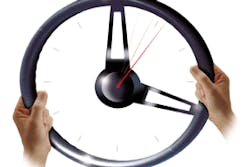Efficiency concerns have prompted the United States Postal Service to ask FMCSA to allow some of its contract motor carriers to work under the HOS rules that were in effect prior to January 4, 2004. If granted, this exemption could have a far-reaching impact since the mail delivery giant holds about 5,100 contracts with motor carriers nationwide. According to a USPS spokesman, to his knowledge the operation has never before requested such an exemption.
In an emailed statement, USPS spokesman Robert A. Anderson told FleetOwner:
The new rules would require changes to many existing highway contract route schedules. USPS believes altering its processing operations would be tenuous and infeasible, and changing the affected highway contract route schedules would be costly and complicated.
One disruptive portion of the rules is the prohibition of stopping the operators “driving clocks” when they take a break. This would allow for fewer miles to be covered by an operator under the highway contract route schedules currently in place.
Given the rigid time schedules of USPS mail processing operations, the revised rules would require more drivers and, in some cases, unique highway transportation operations in order for the mail to arrival/depart on time.
USPS expects that operating under the old rule will achieve an equal, if not better, level of safety than if the new rules were followed, “based on the fact that contracted drivers operate per a reasonable schedule.”
The American Postal Workers Union (APWU), which represents over 330,000 USPS employees and nearly 2,000 private-sector mail workers, warned that there could be serious safety implications if the request is approved.
“Drivers would have very long standby time under the extended-hours tours, which is likely to impact highway safety and even the safety of residential streets,” stated the union. “The hours-of-service were reduced because study after study showed that fatigue is a major factor in highway accidents involving heavy trucks.”
APWU also speculated that the request “may also be part of USPS efforts to reconfigure mail-processing operations,” allowing it the flexibility to consolidate operations.
“USPS is arguing that the rule change will increase efficiency by permitting the same driver to perform both the morning dispatch and the evening close-out,” stated APWU. “This would allow the highway contract route drivers doing the evening close-out and the morning dispatchers to drive additional distances on each trip without being in violation of the rules.”
To view the application notice in the Federal Register, go to http://a257.g.akamaitech.net/7/257/2422/01jan20051800/edocket.access.gpo.gov/2005/05-22648.htm.
To submit comments to FMCSA regarding the application, go to dmses.dot.gov/submit and identify the DOT DMS Docket Number FMCSA-2005-22660 and follow the instructions
